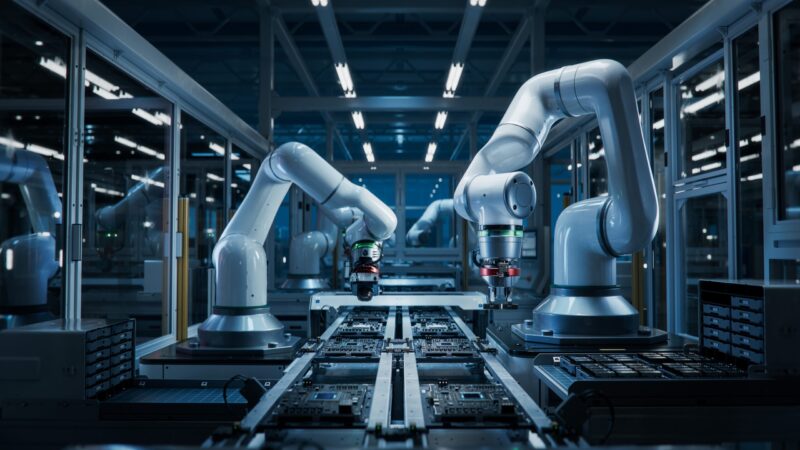
This site
is mobile
responsive

Automation is revolutionising global manufacturing, driving efficiency, innovation, and competitiveness. It marks a significant shift into Industry 4.0, hallmarked by advanced robotics, Artificial Intelligence (AI) solutions, and Internet-of-Things (IoT). Factories now operate as dynamic ecosystems, where interconnected machines work seamlessly with remarkable precision.
The global Industrial Automation and Control Systems market reached a size of USD178,300 million in 2023 and is projected to reach USD342,400 million by 2031, exhibiting a compound annual growth rate (CAGR) of 8.5 per cent from 2024 to 2031. This growth reflects the increasing adoption of automation across industries.
In Malaysia, the embrace of Industry 4.0 principles reflects the nation’s proactive approach towards becoming a global hub for manufacturing excellence. Adopting advanced automation technologies is vital for sustainable growth and maintaining a competitive edge.
‘Smart’ refers to utilising advanced technologies to enhance manufacturing processes by integrating cyber-physical systems, human expertise, and intelligent processes. It leverages technology and automation to streamline production, improve decision-making, and integrate manufacturing processes for greater efficiency.
Here are several key technologies associated with smart manufacturing:

Robotics and AI offer solutions for automating repetitive or hazardous manual tasks, reducing reliance on low-skilled workers. Implementing a strategic upskilling programme can transition existing staff, equipping them with the required expertise to operate and maintain the automated production lines. To bolster the adoption of smart factory technologies, companies should prioritise recruiting experienced personnel in this domain.
In the future, smart factories will rely on AI technology. IoT-connected sensors and equipment can predict machinery maintenance requirements by analysing production data, thereby minimising downtime. Integrating AI with production data significantly improves quality control by automatically detecting anomalies and defects early in the manufacturing process. In factories and warehouses, robots powered by AI work alongside humans to increase productivity and accuracy.
Integrating automated production processes with digital solutions fosters collaboration across departments and unlocks competitive advantages, as AI-enabled digital solutions provide more accurate predictions. Embracing Industry 4.0 technology is crucial for Malaysia’s manufacturing sector to sustain its global competitiveness.
Malaysia’s manufacturing sector is positioned between Industry 2.0 and 3.0 of the Industrial Revolution. Despite a strong technological foundation, the adoption of digitalisation by SMEs remains limited due to:
The Malaysian Government remains optimistic about Industry 4.0, as demonstrated by the New Industrial Master Plan (NIMP) 2030. This mission-based strategy aims to transform 3,000 smart factories in Malaysia by 2030, enhancing capabilities in line with the National Investment Aspirations’ strategic goals.
A smart factory optimises performance through integrated processes across cyber, physical and human domains, employing technology for efficient production. It leverages on technology and automation to create and deliver products and services efficiently while collaborating with other areas within a company’s value chain to improve operations and labour productivity.
Companies can achieve their automation goals by collaborating with system integrators (SI) or industrial automation suppliers. These professionals can integrate machines, equipment and systems to optimise production and operational quality. With vast experience spanning various sectors and projects, SIs offer diverse expertise, enabling them to devise solutions for clients.
Malaysia hosts approximately 50 companies, including renowned home-grown firms like ViTrox, Pentamaster, UWC Berhad, GREATECH Automation Engineering and Genetec Technology Berhad and SFP Tech Holdings Berhad recognised internationally for providing advanced factory automation systems. Each of these companies excels in distinct capabilities, serving both domestic and international markets.
Since 2010, the number of local companies specialising in factory automation has doubled, with the top 10 companies collectively valued at over RM 25.8 billion.
In September 2020, MIDA introduced the Automation Project Initiative (API) to facilitate businesses in adopting automation and smart manufacturing technologies. This programme provides access to leading factory automation providers and SIs through a dedicated physical platform. It also serves as a forum for disseminating information to businesses on government support programmes for automation and digitalisation projects, helping them make informed decisions.
Manufacturers who are interested in participating in this event are encouraged to contact the Machinery and Metal Technology Division at https://www.mida.gov.my/staffdirectory/machinery-metal-technology-division/.
